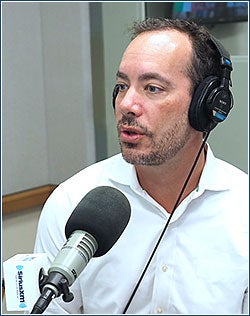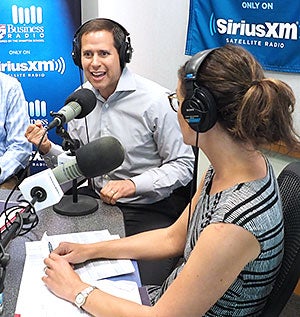Wharton-Sirius Radio Previews Issues From Upcoming LDI 50th Anniversary Symposium

The Department of Health and Human Services’ proposal to eliminate or scale back the Affordable Care Act’s “bundled payment” programs seems counter to early research findings that document the cost savings and improved outcomes achieved by those new payment models, according to University of Pennsylvania health services researcher Amol Navathe.
Navathe, MD, PhD, was one of three Penn faculty members appearing on the Wharton/Sirius “Business of Health Care” radio show to discuss their own areas of research as a prelude to the upcoming two-day Leonard Davis Institute of Health Economics 50th Anniversary “Shaping the Future of Health Care” Symposium. That event brings together more than four dozen top health care research and policy experts from Penn and around the country at a time when federal policies related to issues like bundled payments, the opioid crisis and insurance exchanges are in political flux.
Bundled care and payment research
An Assistant Professor of Health Policy and Medicine at Penn’s Perelman School of Medicine and an LDI Senior Fellow, Navathe heads a research team studying Medicare joint replacement procedures done in the bundled manner.

The “bundled” payment model requires that all services related to a specific kind of surgery be centrally coordinated and billed as a single episode of care — as opposed to the traditional fragmented system of à la carte treatments and billing.
“On the somewhere between $20,000 and $30,000 cost of a hip or total knee replacement,” said Navathe, “we’re seeing up to a 20% savings, depending on which health system we’re looking at. Those are big dollars.” The Penn research also found bundled payment joint replacement patients had fewer post-surgical complications or hospital readmissions.
When they were scaled up after their launch, ACA Medicare bundled payment programs were made mandatory — hospitals in the designated markets have to change their joint replacement procedures and billing practices in order to qualify for reimbursement. But the latest CMS proposal alters that, making bundled services voluntary in some markets, thus enabling hospitals to return to their traditional billing methods. The proposed rule would also cancel mandated bundle programs for other types of Medicare surgeries that were slated to launch soon.
Catalyzing change
“If we really want to make a dent on health care spending in the long run,” Navathe said, “we have to think about how to scale these programs more broadly. Mandating them is a way to catalyze change and that’s probably the most compelling reason to do it. If we go with the self-selection of volunteering, we may end up getting particularly inefficient providers volunteering to be a part of this. A voluntary approach also makes it harder to study and ultimately understand what the real impact of bundled payments is.”
Sirius show host Mitchell Goldman, MBA, noted that Navathe is one of 250 Senior Fellows at the half-century-old LDI who investigate and analyze how the U.S. health care delivery system is organized, financed, managed, and quality controlled. For the last 50 years, the multidisciplinary research and findings of institute’s experts have informed a broad spectrum of policy issues at the federal and state government level as well as throughout the health care business.

The opioid crisis
Another part of the Wharton/Sirius radio show was a discussion about the opioid crisis with researcher and Penn Medicine emergency physician Zachary Meisel. Underscoring the importance of such opioid-related research, Meisel’s appearance came as the CDC was releasing the first governmental statistics for 2016 drug deaths detailing a dramatic year-to-year increase in overdose mortalities.
LDI Senior Fellow Meisel, MD, MPH, is an Associate Professor at Penn’s Perelman School of Medicine and also Director of the Policy and Dissemination core for the National Institute on Drug Abuse-funded Center for Health Economics of Treatment Interventions for Substance Use Disorder, HCV, and HIV (CHERISH).
Physician behavior
Physician prescribing behavior is now widely recognized as a major driver of the current opioid misuse epidemic and both federal agencies and professional medical organizations are working to establish clearer guidelines for the use of opioid-based pain management medications.
Supported by a $2.1 million grant from the Patient-Centered Research Institute (PCORI), Meisel heads a team analyzing the kinds of storytelling methods that can best motivate physicians to more effectively score and understand the potential risks in opioid prescribing.
“We know that there are evidence-based guidelines around opioid prescribing and that ER physicians have not done a great job in actually following the evidence-based guidelines over the years,” said Meisel. “We looked at whether or not stories and narratives may help physicians to be more adherent to a prescribing guidelines and found that, yes, they can.”

‘Narrow networks’ research
The third expert on the show was Daniel Polsky, PhD, who is the Executive Director of LDI as well as a Professor of Health Care Management at the Wharton School and Professor of Medicine at the Perelman School of Medicine. A major part of his most recent research focuses on the “narrow networks” strategies of limited provider coverage used by insurers to lower premium costs.
And, as head of LDI, Polsky said he is focused on both the continued expansion of LDI’s collaborative research activities and capabilities as well as telling the story of the organization’s 50-year history as a pioneer in the field of health services research. He pointed out that the upcoming October symposium is the latest demonstration of how LDI has long functioned as a hub of interdisciplinary research aimed at improving the U.S. health care delivery system.
Campus-wide collaboration
“LDI originally began as an effort to bring together the expertise of Penn Medicine and Wharton School business researchers to address the dramatic demands of the new Medicare and Medicaid systems in the 1960s,” he said. “Since then, LDI has greatly expanded to include experts from the other schools across the campus. For instance, scientists from the School of Nursing are a huge part of our Institute.”
“And,” he continued, “all of these disciplines are working together to address the problems of health care that constitute one of the today’s most pressing national concerns.”
This post originally appeared on the Leonard Davis Institute blog.